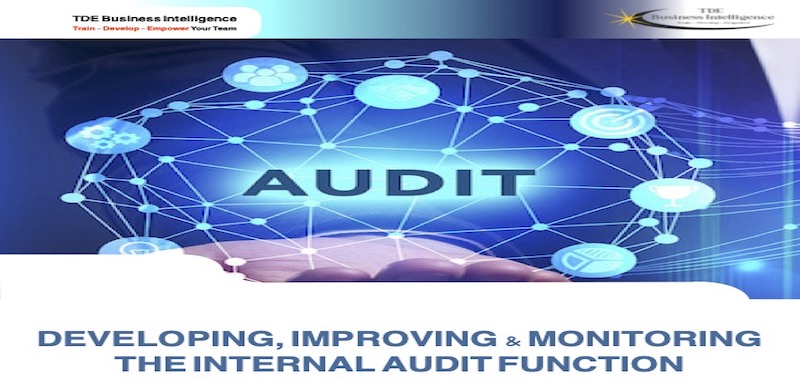
SCHEDULE
| Dates | Venue | Category |
| 19-23 February 2023 | Dubai – United Arab Emirates | Audit-Risk Management |
| 4-8 September 2023 | Port Moresby – Papua New Guinea | Audit-Risk Management |
| 11-15 September 2023 | Bangkok – Thailand | Audit-Risk Management |
| 25-29 September 2023 | Kuala Lumpur – Malaysia | Audit-Risk Management |
INTRODUCTION
Delegates attending this Developing, Improving & Monitoring the Internal Audit Function training course will have the desire de develop or improve their own organisation’s internal audit function. The development, improvement and monitoring of a highly-integrated, internal audit function is essential for the continued financial success, stability and growth of world-class organisation.
A well designed and effective internal audit system will provide verification and support that accounting and financial policies, procedures and controls are working adequately. It will establish a system of internal controls and procedures enabling the organisation to protect itself from the risk of fraud and meet national and international regulatory requirements. Effective auditing not only reduces risk but also improves procedures, efficiency and profitability.
This training course will feature:
- The Role of Audit Staff and the International Standards of the Internal Audit Department required to establish an effective Internal Audit Department
- The different Types of Audit and the benefits to be obtained from each
- Efficient Planning, Controlling and Recording of an Audit Assignment
- Internal Audit Examinations, Controls & Documentation
- Planning and Conducting the Audit Exit Conference and Post Audit Review
BENEFITS OF ATTENDING
Upon the completion of this training, participants will be able to:
- Understand the role and function of an Internal Audit Department and Staff
- Undertake various types of audit to effectively control and monitor policies, procedures and performance
- Evaluate the effectiveness of Internal Controls and Security Policies
- Understand audit risk and efficiently plan, control and record an audit assignment
- Conduct efficient Audit Exit Conferences and Post-Audit Reviews
WHO SHOULD ATTEND?
- Accounting and financial professionals and senior management that are presently or may interface with the daily functioning of an internal audit department
- Financial and non-financial professionals who may be appointed to support or interface with an Internal Audit Committee or that might review internal audit findings for Boards of Directors or investor/shareholder reports for other informational purposes
- Non-financial professionals that may need to coordinate other activities with an internal audit department and/or share findings, reports or information
COURSE MODULES
Session 1: Internal & External Auditing and the Role & International Standards of the Internal Audit Department
- Defining the Distinctions and Responsibilities between Internal and External Auditors
- Identifying the Internal Audit Staff Positions
- Identifying Internal Audit Staffing Requirements
- Techniques for Ensuring Credibility for the Internal Audit Team
- Developing the Audit Committee Charter for a Board of Directors
- Review of Statements on International Auditing Standards Update and General Auditing Practice Issues
Session 2: Examining & Understanding the Differences between Various Types of Audits, including Risk Factors
- Fraud and Forensic Audits
- Compliance Audits
- Operational Audits
- Information Systems Audits
- Financial Audits
- Risk Factors & Audit Risk Alerts
Session 3: The Audit Process, Programs and Planning & Commencing Internal Audit Examinations
- Developing Streamlined Processes for Conducting Internal Audit Examinations
- Identifying Effective Audit Programs for the Various Types of Audits
- Risk-Based IT Audit Procedures
- Key Considerations for your Internal Audit Plan
- 20 Questions Directors Should Ask about Internal Auditing
- The Audit Commencement Conference Meeting
Session 4: Fieldwork: Internal Audit Examinations, Controls & Documentation
- Evaluating Internal Controls & Substantive Procedures
- A Detailed Examination of the Budget Process & Budgetary Controls
- Planning & Conducting Audit Interviews
- Accumulating Relevant Documentation during the Internal Audit Process
- Professional Standards and Responsibilities Associated with Internal Auditing Documentation
- Sampling & Statistical Analysis to ensure a Representative Sample
Session 5: The Audit Exit Conference, Findings and Post Audit Review
- The Internal Audit Draft & Final Report: – Findings and Suggestions for Areas of Improvement
- Planning the Audit Exit Conference Meeting
- Distributing the Final Internal Audit Report within the Organization
- Client Survey
- Conducting Post-Audit Reviews/Follow Up Audit
- Improving Corporate Governance
